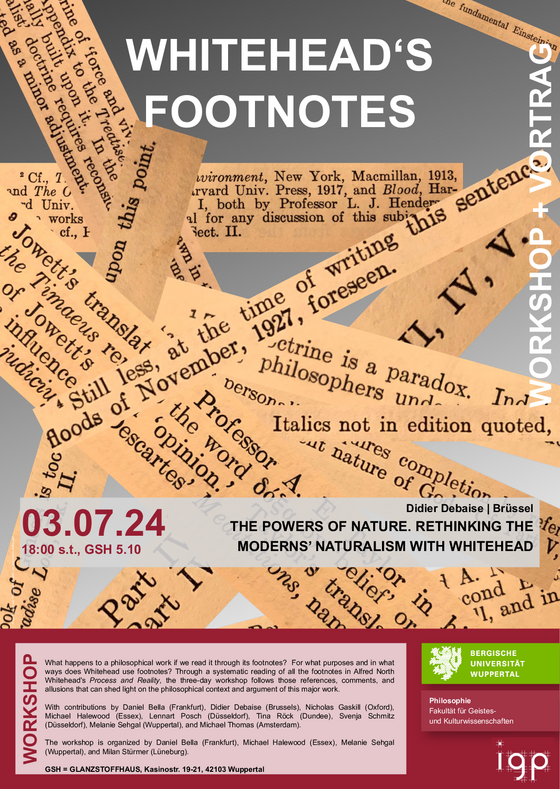AUFKLÄRUNG NACH DER AUFKLÄRUNG ENTSTEHUNG UND VERWENDUNG EINES BEGRIFFS ZWISCHEN 1850 UND 1920
AUFKLÄRUNG NACH DER AUFKLÄRUNG ENTSTEHUNG UND VERWENDUNG EINES BEGRIFFS ZWISCHEN 1850 UND 1920

Whitehead’s Footnotes – A Workshop
organized by Daniel Bella (Frankfurt), Michael Halewood (Essex), Melanie Sehgal (Wuppertal), Milan Stürmer (Lüneburg)
3-5th of July 2024 in Wuppertal, Germany
On page 40 of Process and Reality (Corrected Edition) Whitehead states that “The ontological principle, as here defined, constitutes the first step in the description of the universe as a solidarity of many actual entities.” There is a footnote to the word ‘solidarity’ in which he declares that the “word ‘solidarity’ has been borrowed from Professor Wildon Carr’s 1917-18 Presidential Address to the Aristotelian Society.” Whitehead mentions the title of the address but makes little more comment except to say that Wildon Carr “develops the fundamental principle suggested by this word.” However, a reading of Wildon Carr’s article reveals that his usage of the term refers not to the common understanding of bonds between contemporary individuals but, rather, it invokes a specific aspect of Roman law:
“It [solidarity] was originally a term of Roman and Civil law to express the character of a contract which, in a single matter, involved several obligations on the part of the debtors, with corresponding rights to the creditors […]. The term solidarity means that diverse, even divergent, activities together bring to pass a single common result to which all the activities contribute without sacrificing their individual integrity” (Wildon Carr, 1917-18: 32).
The final sentence could have come straight from Process and Reality as for both, Whitehead and Carr, solidarity concerns the process through which a range of divergent factors leads to one outcome. Thus, solidarity is not a matter of bonds between contemporaries – it is about the passing on of the world. And yet Whitehead leaves this explanation tucked away in a footnote.
Hence, in this workshop we will review Whitehead’s footnotes in Process and Reality in order to develop a fuller understanding of both the context and the manner of his writing and argument. For what purposes and in what ways does Whitehead use footnotes? By examining Whitehead’s footnotes in Process and Reality, this workshop sets out to explore the writers and writings Whitehead invites his readers to take into consideration, to re-read those passages of Whitehead’s own work that he refers the reader to in the footnotes, and to see how far Whitehead’s footnotes can shed light on the philosophical context and the argument of Process and Reality.
With Daniel Bella (Frankfurt/Main), Daniel Beatty Garcia (London/Berlin), Didier Debaise (Bruxelles), Nicholas Gaskill (Oxford), Michael Halewood (Essex), Karin Harasser (Linz), Lennart Posch (Düsseldorf), Tina Röck (Dundee), Melanie Sehgal (Wuppertal), Milan Stürmer (Lüneburg), Michael Thomas (Amsterdam)
Didier Debaise (Brüssel): Rethinking the Moderns’ Naturalism with Whitehead,
The talk will take up Latour's and Descola's critique of the "naturalism" of the moderns, in order to follow the way in which Whitehead's thought poses a different kind of diagnosis on the thinking of the moderns, and opens up a new perspective for thinking about a different kind of "nature".
Didier Debaise is a permanent researcher at the Fonds National de la Recherche Scientifique (FNRS) and Professor at the Free University of Brussels (ULB). His main areas of research are speculative philosophy, the invention of the concept of Nature, new forms of perspectivisms, and the connections between American pragmatism and French contemporary philosophy. His recent publications include Speculative Empiricism. Revisiting Whitehead, Edinburgh University Press, 2017 and Nature as Event. The Lure of the Possible, Duke University Press, 2017.
Karin Harrasser (Linz): Fußnotenfallen. Zur Übersetzung von Donna Haraway, inklusive einer Lesung.
Die Fußnotenlesung aus Donna Haraways »Unruhig bleiben. Die Verwandtschaft der Arten im Chtuluzän« wird eingebettet in einen Bericht über Übersetzungsprobleme, -freuden und -strategien mit einem Buch, das die Geste des Übertragens zur Methode macht. Es schaltet nicht nur zwischen ganz unterschiedlichen Wissensfeldern und Genres hin und her, sondern stellt auch die Frage nach dem Realitätsgehalt von Metaphern ins Zentrum. Haraways Fußnoten sind dabei ein Genre für sich, sie stützen den Text weniger ab, als dass sie Fallen aufstellen und Gesten der Wissenschaftlichkeit unterminieren.
Karin Harrasser ist Kulturwissenschaftlerin und Interimsdirektorin des ifk Internationales Forschungszentrum Kulturwissenschaften der Kunstuniversität Linz in Wien sowie Vizerektorin für Forschung. Zuletzt erschienen von ihr Surazo. Monika und Hans Ertl: Eine deutsche Geschichte in Bolivien, Berlin 2022 und Gegenentkommen. Beobachtungen zur kolumbianischen langen Gegenwart, Berlin 2023.